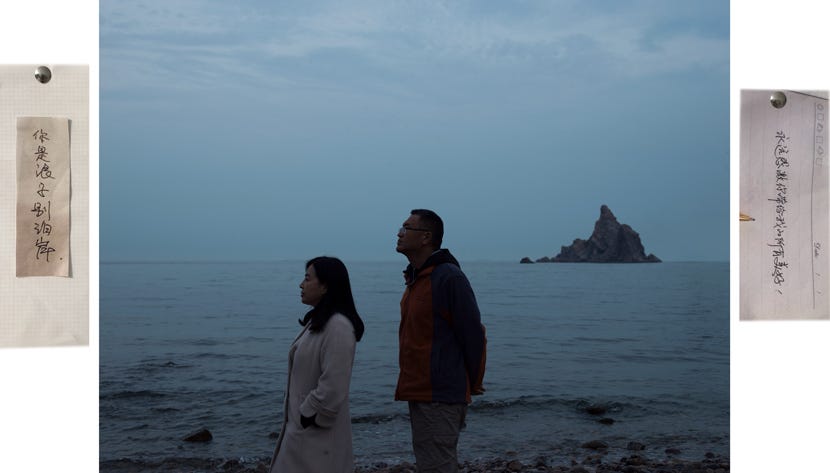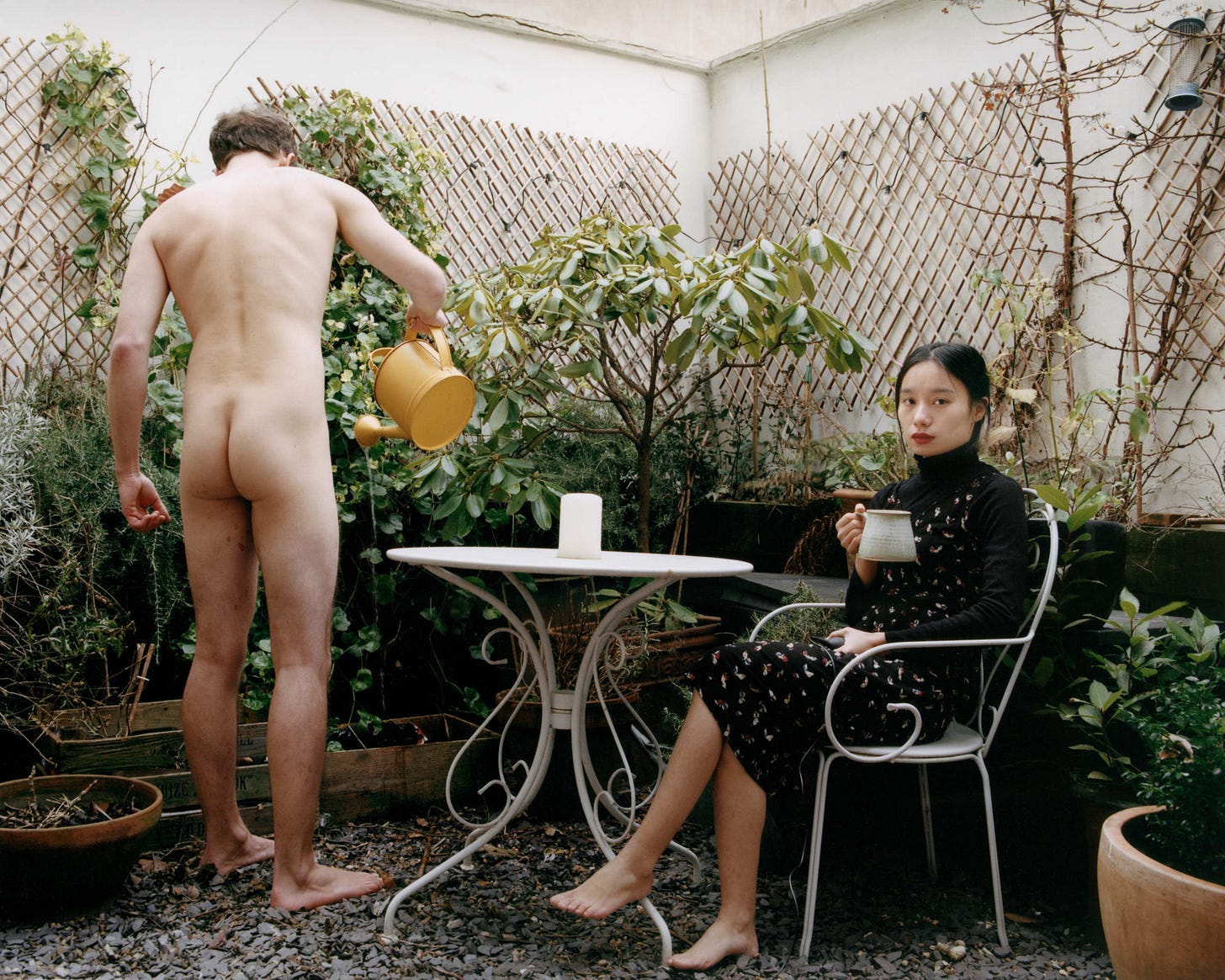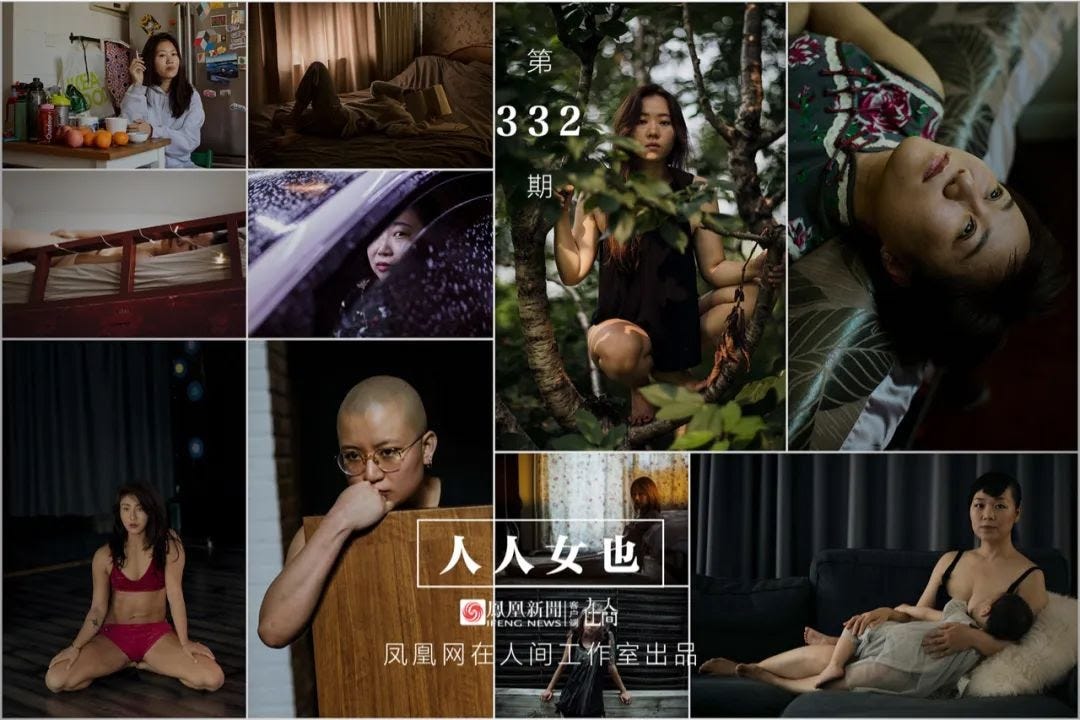Issue #1: Love Cage + Female Gaze + World Press Photo Win, and more
Dealing with divorce, the fetishized female body and grieving for loved ones in Wuhan through photography and video.
Hi there,
It’s Yan, Beimeng, and Charlotte here. This is the first newsletter of Far & Near, a collection of the best visual stories (mostly) coming out of China.
You may know us from before as Depth of Field, a column on ChinaFile we published from 2016 to 2020. You may also have come across Beimeng’s video curation newsletter No Talking Head. We’d like to thank you for your readership if you’ve been following us there.
For new readers, we’d like to let you know about our core mission: introducing the outside world to socially conscious stories created and published by Chinese visual journalists, artists, and filmmakers that are not typically seen internationally. We believe in visual’s power as a universal language that can transcend borders and tell nuanced stories. Through Chinese eyes, we hope to inform you about the most important conversations happening in Chinese society and the diaspora.
Here are a few new things you’ll see in Far & Near. On a curatorial level, we’re expanding our reach from journalistic stories to also include work that reflects the wider artistic practices of visual storytelling. The common thread is they will all touch on social issues.
Later, we’ll also offer our paid subscribers in-depth Q&As that delve into the making of stories, the careers of visual storytellers, and new phenomena arising in China. All membership fees will go directly toward the production of this newsletter.
So with that bit of housekeeping out of the way, here is what we have for you this month.
Love Cage
A divorce, no matter how well handled, is perspective-altering at best for the child involved, and traumatizing at worst. The associated social stigma can further aggravate an experience that often takes a long time to process. Guizhou-born photographer working under the pseudonym “214,” whose parents divorced when he was in high school, has his own way of healing: Eight years after the event, he handed them each a point-and-shoot camera, asking them to shoot as they like.
On Jan. 1, seven months after the public introduction, China implemented an unpopular law that imposes a 30-day cooling-off period on divorce. The law adds yet another hurdle to divorce in an attempt to slow down the rising divorce rate. Many unhappy couples rushed to get out of their marriage before the law took effect.
In June last year, “214” shared the results of his family experiment to make a case against the new law. The photos taken offer intrigue and surprises, revealing the different lives the former spouses now live. Also revealed are paths once again crossed — unaware, the ex-couple photographed the same park, stood at the same spot in the same traditional Chinese covered walkway, and pointed at TV screens that displayed the same military parade broadcast. The coincidences, however, are just coincidences and nothing more, concluded the photographer. “A broken marriage is like a horizontally growing wisdom tooth,” he wrote for the WeChat public account of Seashore Library, a publishing platform for visual stories. “Life goes on after pulling it out. The so-called cooling-off period will only prolong the pain.”
Another photography project about divorce in China takes a totally different but also creative approach. Photographer Meilin Gao, who published a few selects from her series, “When We Two Parted,” on the news website Sixth Tone, took unposed photos of 12 divorced couples, paired with their handwritten notes, as their souvenirs for each other. Her divorced parents participated in the project as well.
The Female Gaze
In March, the abhorrent murder of six Asian women in Atlanta renewed discussion on the Western fetishizing of Asian women, who are often reduced to stereotypes of the quiet, traditional and, above all, exotic beauty. In China, racism notwithstanding, women also face repressive realities in a society that still does so little to guarantee their rights, encourage their potential and, on the most basic level, secure their safety. With them in mind, we want to highlight two works:
In January, Charlotte interviewed Yushi Li, a Hunan-born and London-based photographer whose work attempts to strip power from the male gaze and puts female desire in the driving seat. Jokingly describing herself as “a Chinese woman photographing naked Western men,” Li finds her subjects on online platforms such as Tinder and Airbnb. Li said others were often surprised by her boldness. (To this she responds: “Maybe I’m not as well-behaved as you think.”) Her pictures also touched a nerve online about female chastity, imperialism and, ultimately, the agency of the female body, especially when it belongs to an Asian woman.
Photographer Yu Feng, a renowned celebrity photographer in her 30s, has been taking portraits of Chinese women of her generation. Among them are a dancer and fitness blogger, a housewife, a plastic surgery enthusiast, and a solo traveler. Feng portrays them as distinct individuals who face the challenges of career, motherhood, and self-worth. Her method of combining the portraits with text told from the subject’s perspective creates a powerful narrative of many struggles of Chinese women to balance personal values and familial responsibilities.
World Press Photo Win
Caixin Global’s video “Good Morning, My Wife in Heaven” won third place in the short video category of World Press Photo’s digital storytelling competition. The three of us at Far & Near were all very moved by this video, which tells the story of Wuhan resident Laohei and his late wife, Shunzhi Deng, who died from COVID-19 in January 2020. The most powerful and emotional part of the video is Laohei reading a selection of 200 messages to his late wife.
It’s worth noting that the video was done in late May 2020, after Wuhan’s lockdown was lifted. Yet it told a human story much more effectively than many others captured earlier.
Yingfei Liang and Shumin Wei, the co-directors, approached the story with tremendous sensitivity and well-thought-through intentions. In an article discussing the production details published recently by Caixin, the team mentioned the guilt they felt when asking Laohei to retell his memories and read his messages to his late wife. But after the video came out, their purpose of documenting the loss of life became clear. Wei said, “Behind every number it’s a person’s life. To document is to not forget, and to not live lightheartedly.”
P.S.: Another video team, Shenlai Yang and Xiaolan Tang from The Paper, won World Press Photos’ Online Video of the Year award for the story “Calling Back from Wuhan.” We’re not commenting on the video because it is not available publicly.
What else we are watching:
By inviting Black people to share their experiences of living in Beijing, Daisy Xu and Siyu Chen examined and debunked some of the common misconceptions in China about race. Beimeng contributed as an academic adviser to the piece.
Arrow Factory dedicates a 22-minute film to a rare Guangzhou-based improvisational dance community that mixes dancers with and without disabilities in the same performances.
What we noticed:
In March, four young Chinese documentary filmmakers, three of them former Tencent employees, started their own studio, Spring Film. As platforms cut down staff positions, more and more visual journalists are forming collectives or studios with like-minded colleagues.
Who we are:
Yan Cong is a Beijing-based freelance photographer and documentary film producer. She sometimes writes about internet culture for Chaoyang Trap.
Beimeng Fu is a video journalist based between Beijing and Shanghai. She is a lover of language and documentary.
Ye Charlotte Ming is a journalist and photo editor covering stories about culture, history, and identity. She’s based in Berlin.
Writers: Yan Cong, Ye Charlotte Ming, Beimeng Fu; Copy Editor: Andrew Menezes
Have a comment or just want to say hello? Drop us a line at yuanjinpj@gmail.com
Liked our content? Become a paid subscriber of Far & Near and forward it to a friend!










